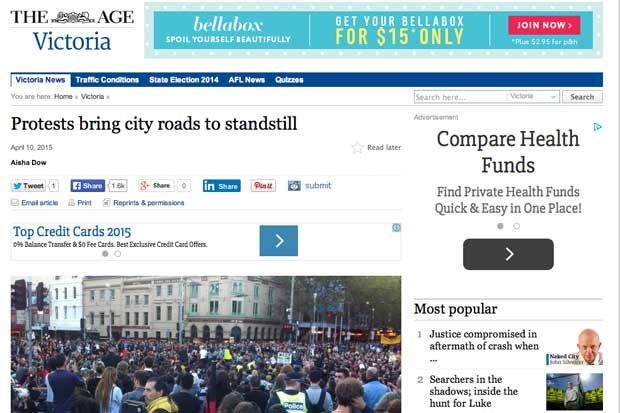Last Friday, 4,000 people in Melbourne and another 800 in Sydney took to the streets to convey their deep anger. An act of protest against the forced closure of remote Indigenous communities, emotions ran high as speakers expressed their disgust at the devastating impact that this move would have on their communities.
One Indigenous man repeatedly chanted that it was an ‘attack on our culture.’
Only a fortnight prior, it was rally against rally as thousands of anti-racism supporters gathered across the country to counter what I can only describe as the bigotry fuelled Reclaim Australia marches.
Unsurprisingly, but nonetheless unfortunately, several people were hurt that day as a consequence of violence.
And again only a fortnight before this public demonstration, we witnessed the Palm Sunday rally – which attracted in Melbourne alone, 15,000 people who condemned the government’s asylum seeker policy.
Calling for an end to compulsory detention, marches took place in 12 Australian cities.
On one hand, it is extraordinary that communities are able to be mobilised to take a stand against acts of injustice. But on the other, I think we can all comfortably acknowledge that these three protests have been initiated from a larger need to respond to a fear of the other – a powerful enemy that continues to appear time and time again in these struggles.
A fear of a way of living that many of us may not fully understand, or a fear of difference, or a fear that our everyday ‘norm’ could be disrupted by someone else.

Too many of us have been conditioned to view the world in such a way, where there are two categories of people: those that belong, and those that don’t. And we are taught that if we personally are to belong and be successful in society, then we must reject those that are ‘others.’
But with such discriminatory beliefs, are we going down a dangerous path?
Anyone that doesn’t think that prejudice is alive and well in the Australian community is kidding themselves. What is stormed about in the streets, can be reflected in the schoolyard. And conversely, close-minded attitudes that begin in the home seep out into workplaces, and wreak havoc in public spaces.
But none of this makes it acceptable, and in fact, it is costing all of us, our well-being.
Regardless of the type of race, sociologists have shown that individuals who experience racial discrimination are particularly vulnerable to negative health effects.
Discrimination does not privilege any one population group; it simply causes pain for all. And whether it is because of sexism, homophobia, racism, physical disability bias, weight / body-size bias, all of these variables correlate with physical, social, and mental health challenges for people. Not only that, it can lead astray people, who already feel at the fringe of society, to a whole host of dangerous consequences.
However, as recent as these research findings are, they simply do not tell us anything other than what we suspect to be the case already. In fact, I worry that by turning attention to those most marginalised by discrimination, that I’m also contributing to entrenched, but unhelpful realities.
Our efforts instead need to turn to those that harbour prejudice, including looking inward at our own selves at times, to understand society’s obsession with exclusion.
At one point in our lives, each of us can recall the pain of feeling left out, feeling like we don’t belong, and feeling ashamed to be ourselves. To put it plainly, it sucks. So why should we inflict that suffering on others?
As colourful as they can be, I honestly wish we never had to protest, especially to champion attitudes of compassion and fairness – which feel like common sense values that should be shared by all of us as Australians.
But if it means, that in the process of marching, we are rewriting stories for our communities, of the diversity that we stand for and the injustice that we refuse to tolerate, I will keep walking until none of us have a reason to do so anymore.
And I hope, you will too.
Minto Felix is a mental health advocate. His Twitter handle is @mintofelix.
Donate To New Matilda
New Matilda is a small, independent media outlet. We survive through reader contributions, and never losing a lawsuit. If you got something from this article, giving something back helps us to continue speaking truth to power. Every little bit counts.



